Don’t expect it to be quick, though. Choosing the right keywords for a website should be a careful process. The keywords you pick will represent your business and play a deciding role in defining your website’s position in Google search results.
In this article, you’ll find 3 simple yet effective tips to help you get website keyword research done right.
Website Keyword Research: Before or After the Design?
Many website owners often ask when they should choose the keywords: before or after designing a website.
This is a very important question to ask because:
-
design considerations. The results of keyword research can influence the design (the number of main menu items, etc.). Having too many keywords and a simple design might be confusing
-
competition. Content and SEO competition is very high so you need to find low-competition keywords, i.e. those that give the best chance to rank high.
That’s why I recommend you start with keyword research before building your website.
When you’re done researching, you can choose a customizable website template and create an SEO-optimized website.
This will help you get ahead of many competitors right since the website launch day.
To make that possible, let’s make sure that you find the best keywords.
3 Simple and Effective Tips to Choose the Right Keywords
Keep in mind these tips during your keyword research.
1. Start with a Simple Thought Experiment
Website keyword research takes some time and effort, but stars with a very simple thing.
You need to think about a few phrases that best represent your business.
Basically, try to answer these questions:
-
what does your business do?
-
what kinds of products/services do you sell/provide?
-
what goals of your customers can you help with achieving?
Here’s an example to help. Here at WebSelf, the main goal of the company is to help people create websites for themselves.
From there, many other connected words can be thought about: SEO, design, look, domain, etc. Basically, everything connected with websites.
Since WebSelf’s customers are using these words to find the company online, they are smartly included in the website copy.
“Website,” “Create your own free website,” “Simple design” - everything counts, as far as Google is concerned (and long as it’s relevant).
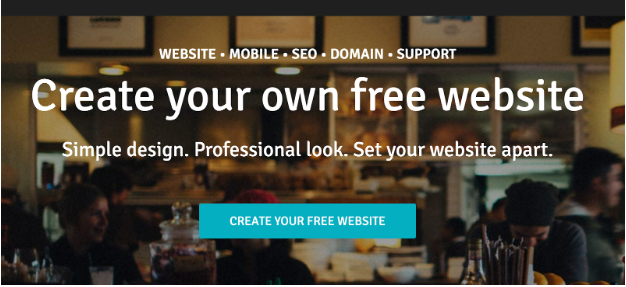
That’s why I recommend you start with a list of words they describe your business and main value proposition.
They will be your head keywords but just predictions for now. We’ll test their accuracy and effectiveness in the next step.
2. Conduct a Google Keyword Test
Now, we’re going to turn to Google for help.
Its suggestions are created based on real user inquiries, so they can be helpful to create more targeted and specific keyword phrases.
Doing such keyword research is a bit like looking at reviews of companies. As a company, if a keyword is good and many people use it, it’ll show up in the suggestions.
Let’s assume that you’re building a website for a digital marketing company.
Here’s how you can start your research.
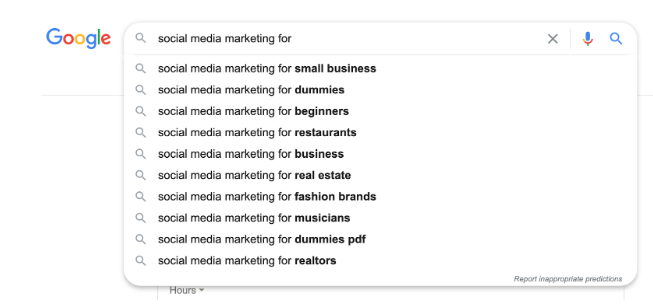
Try changing the inquiry and see what Google gives you. Its suggestions could be helpful to define titles for:
-
website menu sections and subsections
-
headings and subheadings in website copy
-
meta titles and descriptions
-
Texts for the About Us page.
Play with Google and you’ll have a decent keyword list within an hour.
3. Get Keyword Suggestions from UberSuggest
Now that you’re more familiar with keyword research, we can move on to something a bit more advanced.
UberSuggest is a tool that will help us get more keyword suggestions.
It’s free and provides keyword ideas together with two very important indicators: search volume and SEO difficulty.
Search volume is the number of web searches a keyword within a month. The higher it is, the better for you.
SEO difficulty is the estimated competition level. It ranges between 0 (the lowest competition) and 100 (the highest competition). The lower this number is, the better, but aim for difficulty below 30 if possible.
Let me demonstrate with an example. At this point, you’ve compiled quite a list of keywords, so type a phrase in UberSuggest’s search bar.
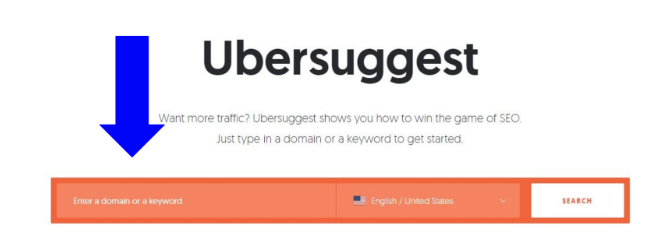 Let’s say we’re searching once again for “social media marketing.”
Let’s say we’re searching once again for “social media marketing.”
We type these in and here’s what we get.
The search volume is decent at 40,500. But the SEO difficulty is quite high and estimated at 44 out of 100.
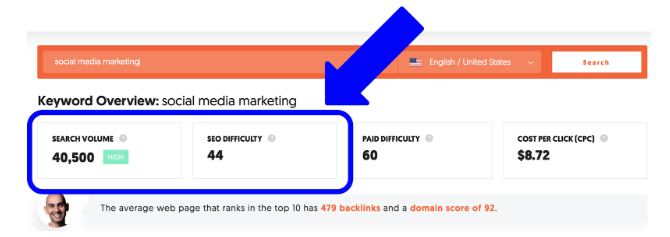
Try different keyword combinations to find the best ones.
|
Important!
A high SEO difficulty isn’t a reason to abandon a keyword if you’re planning to use it for website copy.
For example, if your business provides “social media marketing” services, there’s no point in changing it to get a lower difficulty score.
However, for website content like blog articles, try to get lower values to help your content break through the competition easier.
|
Another way to use UberSuggest to get keywords is to type in a website domain. If given a website address, it generates a domain overview with the list of recommended keywords.
This could save you a lot of time. If you don’t have a website live yet, you can use one from a competitor.
For example, to show you how it looks like, let’s use the English language version of WebSelf: www.en.webself.net.
Here’s what UberSuggest recommended.
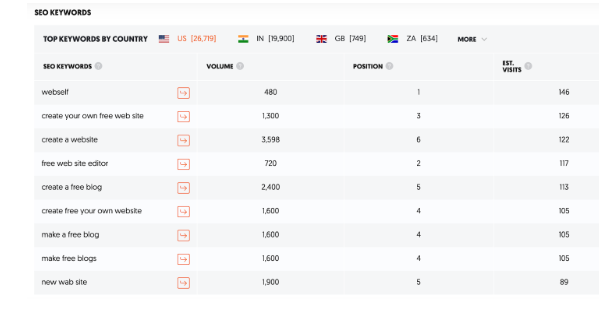
As you can see, people who want to create a free blog or a website search for WebSelf.
There’s also “Create free your own website” in the list that closely resembles the headline at the website’s home page, remember?
Finding out these options can be immensely helpful in choosing the right keywords for your website.
So In Conclusion...
So what do you think of keyword research? It’s not that bad, right?
It’ll take you some time, but you’ll get there. Use these tips and you’ll find the best keywords for your website.
Hopefully the keywords you select will help you to get a good start for your website.
Daniela McVicker is a passionate digital marketer. Daniela is interested in everything related to SEO and blogging. She collaborates with several websites where she shares her experience and helps marketers make their name in the online world.